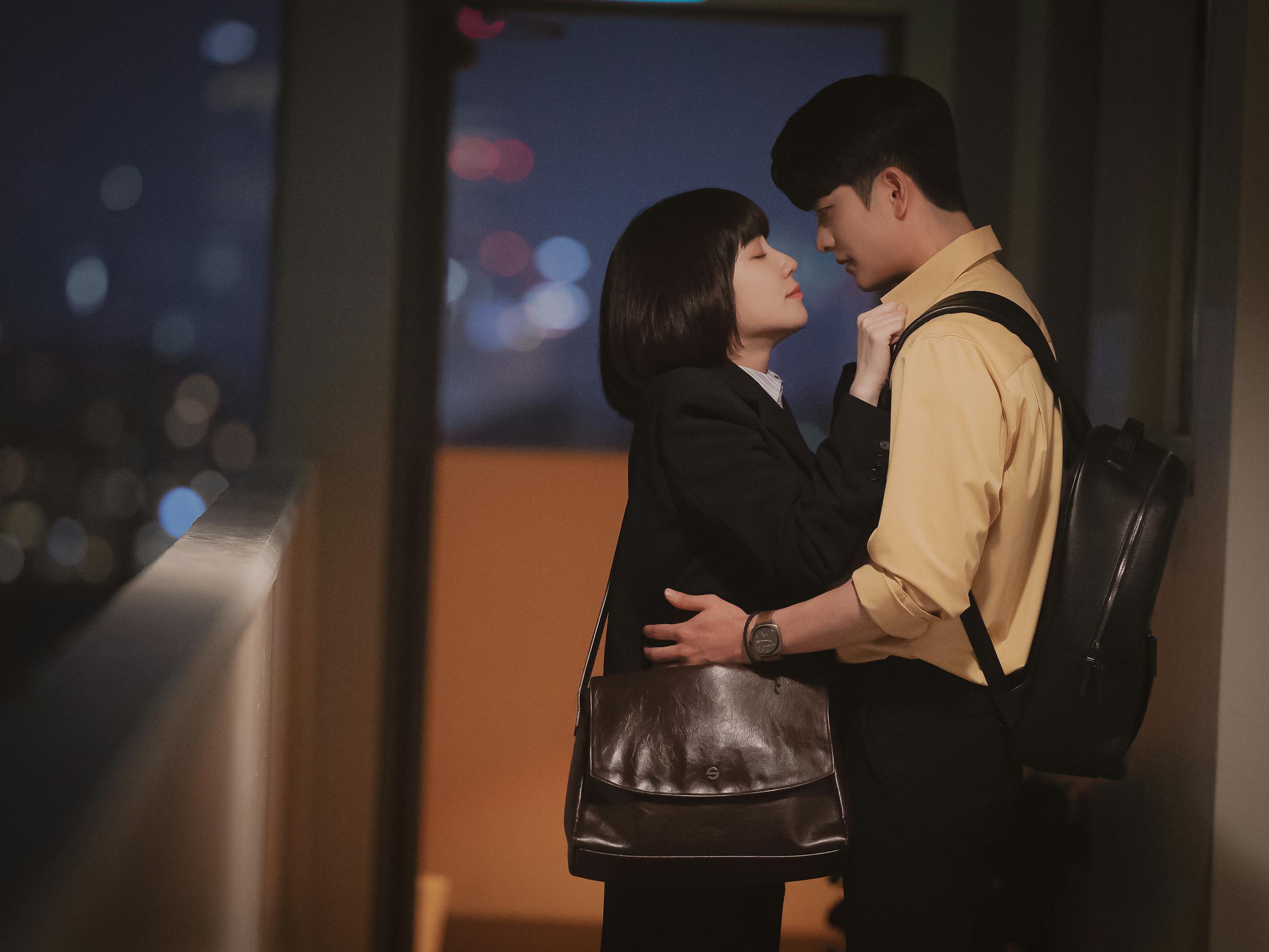K-romance is the next big global trend on Netflix.
It’s a Saturday in 1987 and people in South Korea are gathered around their television sets, head over heels for the soap opera Love and Ambition. It’s the country’s first big commercial TV hit, but that, of course, is only the beginning. Over the next 35 years, the whole world is going to fall in love with K-romance.
In the late 1990s, South Korea began successfully exporting TV series to neighboring Asian audiences, which led to K-dramas blowing up regionally in the early aughts, with the wild popularity in Japan of 2002’s Winter Sonata at the center of the trend. The phenomenon had a name: hallyu, a Chinese term that translates literally to “Korean wave” and encompasses the proliferation of K-culture around the world — not just television but film, music, cosmetics, food, and other popular-culture products. The TV genres experiencing success outside of South Korea would ultimately grow to include everything from period dramas to crime shows, but at the heart of early hallyu was the romantic melodrama. The premise had universal appeal: A poor, honest girl meets a wealthy (often difficult) man and against the odds, they fall in love. Around this premise grew a host of tropes and classic genre touchstones: the disapproving mother-in-law, the kimchi-making scene, the hug-from-behind, the lovers stuck in a downpour, the wrist-grab, the car accident . . .
When the first K-dramas became available on streaming services in the early 2010s, I was ensconced in my high school bedroom, binging romantic favorites like Boys Over Flowers and Coffee Prince via some less-than-reputable websites — a common practice among the burgeoning U.S. fanbase. A decade later, Netflix — more than any other streaming service — had transformed the market for these shows, investing in Korean productions at the same time that the broader Korean wave produced Parasite (2019), Blackpink, and the skin-care sensation that is snail mucin.
Netflix made K-dramas widely available to a unified global audience for the first time. A new scale of production turned serialized TV into a series of pseudo-blockbuster films. And the platform could dub or subtitle shows in an unprecedented 30-plus languages. “Despite the diversity of languages, the common thread of understanding and accessing Korean content seems to be a key strength that has set Netflix as a trendsetter,” says Wooyeon Yang, director of content in South Korea. Last year, an astonishing 60 percent of Netflix subscribers watched a Korean-language show or movie.
Take Squid Game (2021): The Netflix-developed survival thriller became the most-watched show ever on the service. It garnered 14 Emmy nominations and six wins — making history for a non-English language series — and ushered K-dramas into the epicenter of the global mainstream. “Who would have guessed that a TV show made in Korea for Koreans would cause a craze for green tracksuits in America, or push sales of Vans sneakers up by nearly 8,000 percent when released on Netflix?” asked C.E.O. Ted Sarandos on a recent visit to Seoul. “That’s the power of Korean storytelling.”
One thing Squid Game was not: a romance. Instead, it was part of a body of Netflix series finding major success as they reimagined what K-content could be. Many of these were flavored with sci-fi, fantasy, or horror. The coming-of-age zombie thriller All of Us Are Dead and the vicious revenge tale The Glory both hit Netflix’s Top 10 in more than 90 countries when they came out in 2022. The reality show Physical: 100, which pits South Korea’s strongest athletes against each other in brutal competition, settled into the global Top 10 for more than a month in 2023.
But the genre at the heart of K-drama — the one that emptied the streets in South Korea in 1987, that swept Japanese audiences off their feet in the early 2000s, that kept me glued to my screen, computer viruses be damned — is proving itself once again. K-romance is the next big global trend on Netflix.
Viewership for K-romance grew threefold between 2018 and 2022, with 90-odd percent watching from outside of South Korea. Romantic comedy Crash Landing on You (2019) underscores the point. A smash hit in Japan — Netflix’s most popular offering there in 2020 — it landed in the Top 10 in the U.S. at the start of pandemic lockdown. It still ranked in the Top 10 in some markets in 2023. The webtoon-inspired Business Proposal (2022), meanwhile, was on the list of most-watched TV in 58 countries. This summer’s King the Land ranked in the Top 10 in 55 countries within two weeks of its release. Extraordinary Attorney Woo (2022) was Top 10 in 57 countries; the one-of-a-kind courtroom drama has a sweet romantic subplot and won critical and popular praise for how it represents autism through its central character.
In April, Netflix pledged to invest $2.5 billion in South Korea over the next four years, including training for a new generation of talent in front of and behind the camera. Early this year, Netflix announced 34 new titles across genres — the most ever. “Creators have dedicated themselves to painting the delicate dynamics and evolving emotions of our characters,” says Yang. The interplay between K-romance’s wholesome appeal and swoon-worthy intensity makes for an undeniably “endearing genre that strikes a chord with global viewers.”
K-romance has also become playfully referential, drawing on decades of hallyu, classic shows, and an ever-expanding pool of beloved makers and idols. In the much-anticipated rom-com Castaway Diva, the charismatic Park Eun-bin (Extraordinary Attorney Woo) returns as an aspiring singer trying to take back her dream after being stranded on a deserted island for 15 years. A Time Called You features Ahn Hyo-seop (Business Proposal) and Jeon Yeo-been (Vincenzo) in a remake of the classic Taiwanese romance Someday or One Day. With Doona!, director Lee Jung-hyo (Crash Landing on You) adapts a popular webtoon about a college student navigating everyday life while dealing with an unusual problem: He’s living with a K-pop sensation. Starring real-life K-pop idol Bae Suzy, it becomes a metanarrative on the pressures
of fame.
More than ever before, these shows are meeting and mingling with other genres. There’s See You in My 19th Life, a reincarnation tale about a heroine trying to find her way back to her true love, and Destined with You, a sweeping saga about lovers battling a family curse. A Time Called You crafts a charming romance that’s complete with time travel and doppelgängers, while genre-bender Behind Your Touch features rom-com queen Han Ji-min as a psychic veterinarian who teams up with a handsome detective to solve a serial killer mystery. In short, a K-romance can be whatever it wants to be. “A drama is based on storytelling,” says Business Proposal director Park Seon-ho. “If a story is good, it will resonate with people all over the world.”
Global hits, yes, but made first and foremost for Korean audiences: These titles are making a splash at home, too. As of late July, King the Land had been in Netflix’s Top 10 TV in South Korea every week since its release. Extraordinary Attorney Woo became the most-watched show in the history of cable channel ENA, when it aired in South Korea.
“Our stories touch on the universal aspects of life — love, heartbreak, and tenderness — while also providing a peek into the unique facets of Korean culture,” shares Don Kang, vice president of content in South Korea. “Netflix’s commitment to forging this profound global connection is something we’re truly excited about.”
All content featured in this issue was captured in accordance with guild guidelines.












